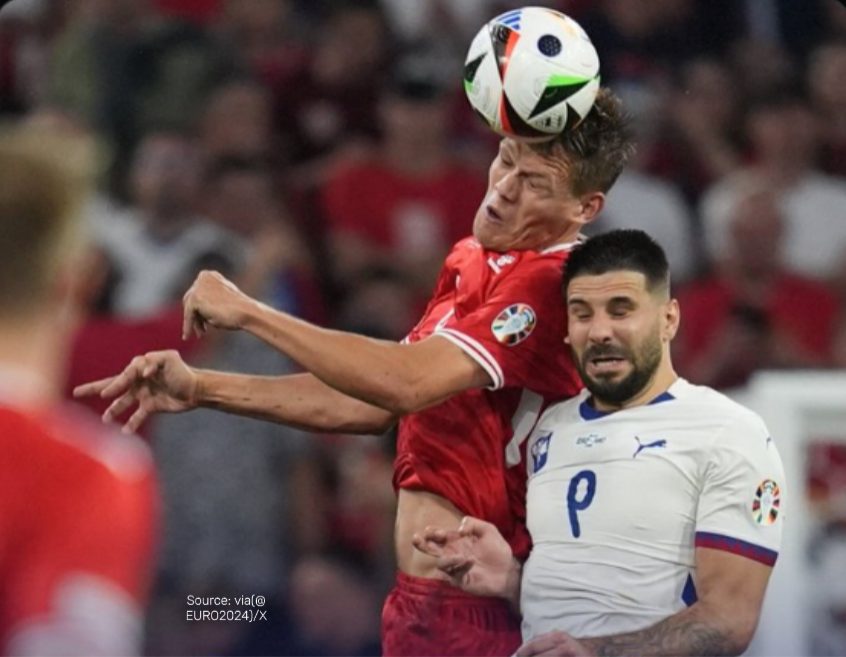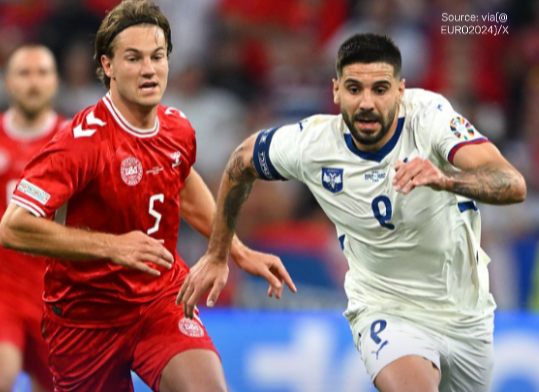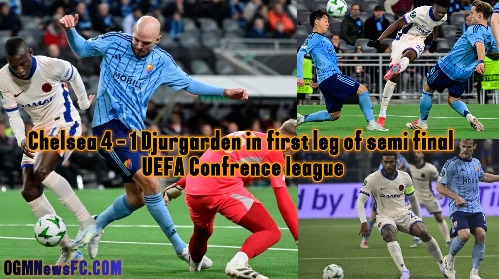Denmark Dominates Possession in Tense Euro 2024 Clash with Serbia
In a highly anticipated Euro 2024 match at the Allianz Arena, Denmark showcased their ball control prowess against a resilient Serbian side. The first half ended with Denmark holding a commanding 60% possession, demonstrating their ability to dictate the tempo of the game. Despite this advantage, the scoreline remained deadlocked at 0-0, highlighting the competitive nature of the encounter.
Denmark’s midfield maestro Christian Eriksen was at the heart of their possession-based strategy, orchestrating play and attempting to create opportunities. However, Serbia’s disciplined defensive structure, led by Strahinja Pavlovic and Nikola Milenkovic, proved difficult to break down. The match’s intensity was evident from the outset, with both teams fighting hard for every ball and challenging each other in the air.
Chances Few and Far Between as Defenses Stand Firm
Despite Denmark’s dominance in possession, clear-cut chances were at a premium throughout the first half. The Danish attack, spearheaded by Rasmus Hoejlund and Jonas Wind, struggled to find gaps in Serbia’s well-organized defense. Alexander Bah came close with a header that went wide in the 16th minute, while Hoejlund managed to direct a shot on target in the 32nd minute, only to be denied by the Serbian goalkeeper.
Serbia, while seeing less of the ball, showed flashes of danger on the counter-attack. Aleksandar Mitrovic, Serbia’s target man, posed a constant threat, winning several aerial duels against Denmark’s center-backs. In the 29th minute, Mitrovic came close to breaking the deadlock with a header, but his effort was expertly blocked by Andreas Christensen, highlighting the fine margins in this tightly contested match.
Disciplinary Issues and Tactical Fouls Shape the Match
The intense nature of the game was reflected in the referee’s notebook, with three yellow cards brandished in the first half. Serbia’s Nikola Milenkovic was the first to see yellow in the 4th minute for a foul on Rasmus Hoejlund, setting the tone for a physical encounter. Denmark’s Jonas Wind followed suit in the 27th minute after a dangerous challenge on Strahinja Pavlovic.

“Denmark and Serbia battle to scoreless stalemate”
Perhaps the most significant booking came in the 30th minute when Denmark’s Morten Hjulmand received a yellow card for a reckless challenge on Ivan Ilic. This incident not only disrupted Serbia’s build-up play but also put Hjulmand in a precarious position for the remainder of the match. The prevalence of tactical fouls and robust challenges underscored the high stakes of this Euro 2024 fixture, with both teams desperate to gain an advantage.
As the teams headed into the break, the match remained finely poised. Denmark’s possession-based approach had yet to yield dividends, while Serbia’s resilience and counter-attacking threat ensured an intriguing second half awaited the spectators at the Allianz Arena. With everything to play for, both managers would undoubtedly be considering tactical adjustments to tip the balance in their favor in the crucial second period of this Euro 2024 encounter.
Tactical Chess Match Unfolds in Copenhagen
The Euro 2024 qualifier between Denmark and Serbia at Parken Stadium in Copenhagen proved to be a tightly contested affair, with both teams demonstrating their tactical acumen throughout the 90 minutes. The match, which ended in a draw, saw a series of strategic substitutions from both sides as they sought to gain the upper hand.
The second half kicked off with a flurry of changes, as both managers looked to inject fresh energy into their squads. Denmark replaced Jonas Wind with Andreas Skov Olsen, while Serbia made two substitutions, bringing on Dusan Tadic and Luka Jovic for Lazar Samardzic and Nemanja Gudelj respectively. These early changes set the tone for a half characterized by tactical adjustments and a battle for midfield supremacy.
Defensive Solidity Reigns Supreme
As the match progressed, it became clear that both teams were prioritizing defensive stability. The Danish backline, anchored by Joachim Andersen and Jannik Vestergaard, proved particularly resolute, consistently winning aerial duels and making crucial interceptions. Serbia’s defense, led by Nikola Milenkovic and Strahinja Pavlovic, matched their opponents’ intensity, effectively neutralizing Denmark’s attacking threats.
The statistics reflect this defensive focus, with possession evenly split between the two sides. By the 75th minute, Denmark held a slight edge with 52% possession, but this advantage had evaporated by the final whistle, with both teams finishing on 50%. The lack of clear-cut chances throughout the match further underscores the effectiveness of both defensive units in stifling their opponents’ attacking play.
Late Drama and Missed Opportunities
As the clock ticked down, both teams showed a renewed sense of urgency in their quest for a winning goal. The introduction of Sergej Milinkovic-Savic for Serbia in the 87th minute nearly paid dividends, as he provided a dangerous cross just minutes later. However, Dusan Vlahovic was unable to capitalize, sending his header wide of the mark.

The drama continued into stoppage time, with Milinkovic-Savic forcing a save from the Danish goalkeeper with a well-struck effort. At the other end, Denmark pushed for a late winner, but struggled to create clear opportunities against a disciplined Serbian defense. The final whistle blew with the scores level, a fair reflection of a match where neither side was able to assert true dominance.
In conclusion, this Euro 2024 qualifier showcased the defensive prowess and tactical flexibility of both Denmark and Serbia. While the lack of goals may disappoint some fans, the match provided a fascinating insight into the strategic approach of two well-matched teams. As the qualification campaign progresses, both sides will look to build on this solid defensive foundation while seeking to add more cutting edge to their attacking play.














